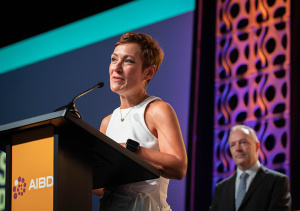Dr. Maria Abreu to Chair Sherman Prize 2023 Selection Committee
Maria T. Abreu, M.D., director of UHealth – University of Miami Health System’s Crohn’s and Colitis Center and professor of medicine and microbiology and immunology at University of Miami Miller School of Medicine, will once again chair the Sherman Prize Selection Committee.

The committee, which will recommend the 2023 Sherman Prize winners, comprises five of the nation’s preeminent researchers, clinicians, health care providers and scholars in Crohn’s disease and ulcerative colitis, known collectively as inflammatory bowel disease (IBD).
Each year, three individuals who have made outstanding achievements in the fight against IBD are chosen for recognition by the Sherman Prize Board of Directors, which is guided by the selection committee. The prizes come with financial awards and communications that showcase the recipients’ work among colleagues and the greater IBD community.
Nominations Now Open for 2023 Sherman Prize
Bruce Sherman, chairman and principal owner of the Miami Marlins, and his wife, Cynthia Sherman, are the founders of the Sherman Prize.
“We are fortunate to have someone of Dr. Abreu’s caliber and expertise in South Florida, and we appreciate her leadership in the Sherman Prize selection process,” said Bruce Sherman. “With nominations now open for the 2023 Sherman Prize, we are looking forward to continuing to highlight the great work being done in the medical community to spread awareness, spark innovation and inspire others so that, one day, families won’t have to contend with this disease.”
The deadline for nominations for the 2023 Sherman Prize is May 21. Eligible candidates should have made exceptional and pioneering contributions that have transformed IBD care.
“Bruce and Cynthia Sherman are champions in the fight against IBD,” said Dr. Abreu. “I was greatly honored to receive the coveted Sherman Prize in 2019 and am privileged to chair the selection committee that recommends the next Sherman Prize winners.”
Abreu Lab Focuses on IBD in Hispanic Patients
The Abreu Lab has distinguished itself by focusing on the genetic and environmental factors that contribute to the development of IBD in Hispanics. This research was driven by Dr. Abreu’s early observations that many of her Hispanic patients were the first in their family to be diagnosed with IBD. Her rigorous collection of data enabled her to publish the first description of the phenotype — or how IBD is expressed — in Hispanic patients, and to characterize the genetics of their disease. Dr. Abreu and her team went on to study IBD specifically in Miami’s Cuban immigrant population, to try to understand what she saw as a rising epidemic of disease.
“In South Florida, our research has pointed to the fact that this is an epidemic among Hispanics, children of immigrants or even immigrants themselves who are developing Crohn’s or ulcerative colitis,” Dr. Abreu said. “The environment here — we think the diet, the microbiome, even pollution — may play a role in setting this off. We are conducting a diet intervention study and are among the leaders in the field of nutritional interventions for IBD.
“One of our goals at the Crohn’s and Colitis Center is to improve the lives of individuals with IBD by creating a program that does microbiome analyses to tailor-design specific nutritional programs for these patients,” she said.
Special Marlins Event for World IBD Day
On May 17, the Shermans will host a special event at the Miami Marlins’ home game at loanDepot park, to recognize the important work being done for the IBD community and commemorate World IBD Day, which will take place on May 19. Dr. Abreu will throw out the ceremonial first pitch at the game.
“World IBD Day sets the stage to call attention to these diseases that affect about two million people in the U.S.,” said Dr. Abreu.
The Marlins game presents an opportunity to spread the word about IBD to a captive audience of athletes, coaches, fans and others about the need for more research on these diseases that can be debilitating, even life threatening. There is a great need to increase funding for research and improve care because there is no cure for IBD. While there have been significant advances in new medications for IBD, there remains a lack of understanding about which patients would benefit most from these medicines.
A portion of the proceeds from ticket sales for the May 17 game will go to IBD research at UHealth.
Tags: Crohn's and Colitis Center, Department of Medicine, Division of Digestive Health and Liver Diseases, Dr. Maria Abreu, Dr. Maria T. Abreu, IBD


